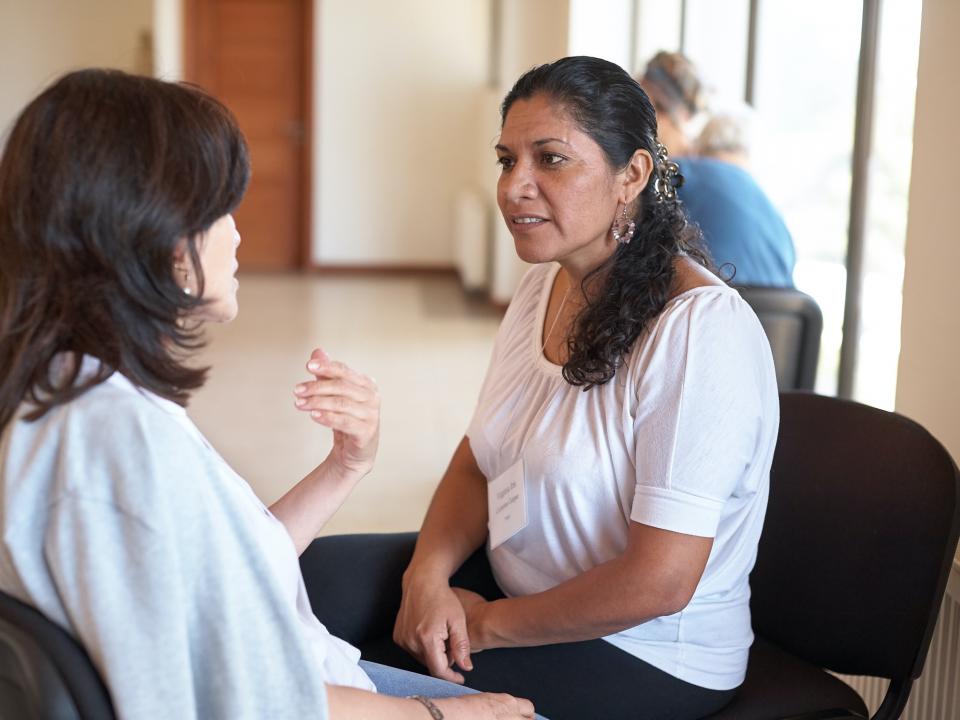What proficiencies are needed for certification
developed by Mary Hendricks-Gendlin (and referred to by Gene Gendlin in his article on Thinking at the Edge in the July 2020 Folio)
Please note that this set of proficiencies is related to CERTIFICATION, and should not be confused with the award for Proficiency in Focusing PARTNERSHIP.
Focusing is a skill that requires development over time, and acquires some of its shape and color according to the life and goals of the practitioner. Below is a general description of Focusing stages of proficiency. Find out about how to become a Certified Focusing Professional.
ITALIAN TRANSLATION OF FOCUSING PROFICIENCY SKILLS
Initial Proficiency
Focuser can sense the body, be with it, from inside.
Focuser can get a "felt sense," a bodily sensation that contains meaning and pertains to a particular situation, for example, an issue with one’s work, a creative project or a relationship.
Focuser can recognize how a felt sense differs from feelings and emotions.
Focuser can recognize when words or images have come directly from the felt sense.
Focuser is able to notice what would feel right to say from the felt sense of a particular situation.
Focuser knows when a decision regarding the situation "sits right" and when it does not.
Focuser can name or describe the crux of a situation in a way that "fits" the felt sense.
Focuser is able to recognize a distinct bodily knowing even when she/he has no words yet to describe it.
Intermediate Proficiency
Focuser is able to access a felt sense easily and comfortably.
Focuser can stay with and return to a felt sense, so that it is a stable referent even as it may open and shift.
Focuser recognizes and is comfortable with the experience of not wanting to attend to a particular situation or bodily knowing.
Focuser knows how to stay near something difficult, neither leaving it nor going further into it.
Focuser is able to find a "right distance" from difficult or complex issues.
Focuser is able to have self-empathy, friendly attitudes toward oneself and the bodily knowledge that arises, even when it involves suffering or seemingly "negative" things.
Focuser can easily get a felt sense of what is in the way when friendly attitudes seem impossible.
Focuser is able to identify the several "situations" being carried by her/his body just now, and to "place" them one at a time, gently, at some distance from the body. Each placing brings a release of tension in the body.
Focuser is able to connect intellectual understanding with bodily knowing, and to carry on a dialogue between the two.
Advanced Proficiency
Focuser is able to attend to a felt sense and allow many aspects of it to emerge.
Focuser often finds whole new fields or "subtexts" emerging from a felt sense.
Focuser can let the subtexts inform a resulting decision on an issue.
Focuser can choose to wait for subtext changes before taking action on a particular situation.
Focuser recognizes new possibilities within a situation, which were not apparent from the original "given facts." New facts can be formulated.
Focuser can discover new questions arising from the felt sense of a situation, leading to a new gathering of information.
Focuser is able to make better decisions based on greater bodily knowledge.
Focuser finds an expanded bodily-sensed realm in which one can move between different "places," clusters, and attitudes.
Focuser can choose to live from the intricacy which is now always accessible.
Focuser experiences a sense of reliable safety inside.
Statement on Diversity Of Approaches (Approved By Board In 2021)
Focusing and Thinking at the Edge always honor what arises freshly in the moment. Frozen structures are antithetical to the ethic of felt sensing. Focusing and Thinking at the Edge and how they are taught by our certified teachers will not be standardized. It is a core value of TIFI that diversity of approaches will be protected. Constructive critiques are welcome among our teachers or between TIFI and individuals presenting or applying practices which arise from Gendlin’s philosophy of the implicit. These should be offered by means of open, respectful communication. TIFI itself will seek to honor the value of diversity of approaches in its offerings.

